OUTLOOK 2004: United States
Washington in 2004
Washington progresses on energy at a snail's pace
John McCaughey, Contributing Editor, Washington
About 30 years ago, as Electric Power Supply Association President Lynne Church pointed out in a recent commentary, the rock group, Grateful Dead, released a song called "Truckin." This is a song that the group's fans (older readers will know that these fans are called "Dead Heads") still sing among themselves.
One of the lines in that song says, "What a long, strange trip it's been..." This is a sentiment that Church finds all too appropriate when one examines federal energy legislation.
Omnibus energy bill status. In Washington's oil and gas circles, 2004 has started with a long-running debate about the energy bill, which failed to clear the Senate late last year. So, now everyone wonders, "will it happen" and, if so, when and what will be in this massive, 1,100-page, $31-billion package that Sen. John McCain (Republican-Arizona) mocks as the bill that "leaves no lobbyist behind?" Rep. John Dingell of Michigan, the top Democrat on the House Energy Committee, spoke of "lifting the lid of a garbage can and smelling the strong smell of special interests."
| |
|
|
|
| |
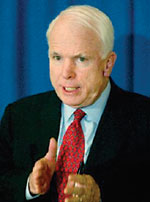 |
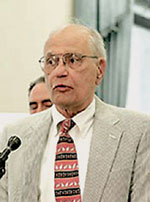 |
|
| |
Passage of the massive energy bill in Congress will require overcoming the objections of detractors like Sen. John McCain (Rep.-Arizona), left, and Rep. John Dingell (Dem.-Michigan), right.
|
|
|
These critics touch upon an interesting point. The bill (the conference report was approved by the House of Representatives but it fell two votes short in the Senate and so has not gone to a final vote) is, indeed, stiff with ear-marks, the current Washington euphemism for old-fashioned pork. Some of the most controversial pork relates to heavy subsidies to ethanol producers and protection against environmental lawsuits for oil companies that make the controversial gasoline emissions additive, Methyl Tertiary-Butyl Ether (MTBE), a competitor to ethanol.
| |
|
|
| |
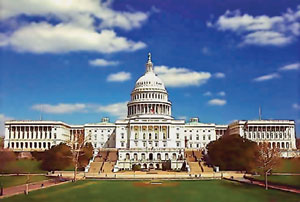 |
|
| |
Congress wasted nearly a year's effort, in terms of committee work, lobbying and negotiating, when the Senate failed to bring the omnibus energy bill to the floor for a final vote.
|
|
|
Perhaps the biggest chunk of pork (an estimated $22 billion) goes to the oil and gas industry, followed by the coal and nuclear power industries. Even the environmentalists – never keen to be left behind – do well in the legislation's language.
What makes McCain's and Dingell's point relevant is that 2004 is different. It's an election year, which means that politicians develop a pious hypersensitivity to voters envisioning them as embracing pork – an inhibition that doesn't bother them in non-election years. There is also a "house of cards" syndrome. The energy bill is so massive and so convoluted, that there is a risk that if one provision is touched, the whole thing could come tumbling down.
The current energy bill has been under development one way or another for almost 10 years. Critics object not merely to the multitudinous barrels of pork but to what they see as the Bush administration's notion of an energy supply crisis (or at least a crisis that the critics believe the free market could comfortably resolve, if a crisis exists at all). A group called Taxpayers for Common Sense calculates that the bill could cost tax payers $96 billion over the next decade. Soon you're talking about real money...
| |
|
|
| |
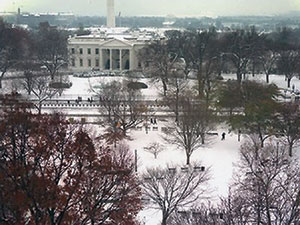 |
|
| |
The Bush administration's efforts to help the oil and gas industry have cooled off nearly as much as the weather outside the White House during this winter season.
|
|
|
Current politics of the mammoth energy bill are interesting. In theory, the Bush administration is behind the bill. But some Washington insiders suspect that the White House sees it as far too expensive. Therefore, the administration is reluctant to spend political capital pushing the bill, leaving the task, instead, to Sen. Pete Domenici (Republican-New Mexico), chairman of the Senate Energy Committee.
| |
|
|
| |
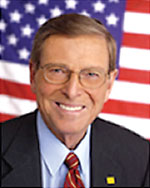 |
|
| |
Sen. Pete Domenici (Rep.-New Mexico) remains the prime architect of oil and gas legislation in the US Senate.
|
|
|
Indeed, in a Jan. 21, 2004, speech on the Senate floor, Domenici said as much: "I believe that the deal before us is the only one that does enough, that can currently be reached. I do not believe it is possible to go back to the table and negotiate a different agreement. Why? Because whatever we bring to the floor will be debated ad nauseam....I say to our President: I believe you ought to be pushing this bill a lot harder."
Market effects on US policy. Meanwhile, what has been happening, and is likely to happen in global oil markets (in other words, OPEC)? Contrary to what the professors tell you in Economics 101 – that all cartels carry within themselves the seeds of their own destruction – OPEC for some decades now seems to have been surviving and even prospering. Oil prices are at a robust $35/bbl (the price of oil jumped 7% in early December), and OPEC would dearly like to lock in the higher prices.
All commodity prices are volatile, of course, and normally this doesn't matter much. But oil is different because it is so pivotal to Western (and especially the American) economies. Partly, OPEC oil price increases can be traced to the decline in the value of the dollar (oil is traded in dollars). Add to that an economic recovery in the US that stimulates demand and the current cold snap that stimulates demand for heating oil, especially in the Northeast. Additionally, global demand for OPEC oil is soaring. Chinese imports are running about 30% above the year-earlier period, according to the International Energy Agency, making China the second-largest world consumer of imported oil behind the U.S.
"In short," says Irwin Stelzer, one of America's most-respected energy economists, "world demand for oil is likely to increase steadily, while supplies lag....and [OPEC] is a cartel not famous for showing consumers any mercy." Good news for the Arabs and for some investors. Bad news for oil consumers.
Essentially, adds Stelzer, "It is not impossible to imagine a situation in which Islamic fanatics somehow curtail Saudi output, or rising demand from China and the US coincides with an inability of Russia, Venezuela, Nigeria and Iraq to step up production, (concurrent) with Saudi adherence to its policy of curtailing output."
Reserve complications. All of these global worries are playing out against another canvas. For some years, there has been a little-publicized school of thought that world oil reserves are close to peaking. Current sotto voce research puts that peaking date at a point as perilously close as 2030. If true, that would have calamitous effects on Western economies (especially transportation) and could only be solved by extracting oil from coal. That technology is well known, but to implement it on a grand scale in the US would take very considerable time and fantastic amounts of money.
Domestically, US oil and gas producers could never meet the task. This would be true, even if they could surmount the obstacles that confront them in drilling on public lands, a goal that the environmentalists will fight (almost certainly with success) to make impossible.
Far from the image of environmentalists as earnest, bearded, young people wearing sandals in shabby, back-room offices, today's environmentalists are well-paid experts. These experts are skilled at lawsuits, lobbying, appeals, alliances and agitation, pointed out Ron Arnold, executive vice president of the Bellevue, Washington-based Center for the Defense of Free Enterprise, which specializes in tracking environmentalists' funding. Most of that funding, he said in a recent speech, comes from very well-heeled, tax-free foundations that "are not accountable to anyone."
The imprecision of oil reserve figures was heightened in mid-January by a bombshell from Royal Dutch/Shell, one of the world's largest publicly-traded oil companies. It abruptly cut its estimates of proven oil and gas reserves by 20%. Shell shares tumbled 7%, as did oil company shares worldwide, and Shell boss Sir Philip Watts may be ready for the professional guillotine. Or he may at least be set for "gardening leave," as the delightful English expression has it, when an executive is informed that his presence in the office is no longer required, and why does he not stay at home and mow the lawn.
The Shell reserve recategorization was triggered by tight US Securities and Exchange Commission (SEC) rules on how companies must book reserves. But, as everyone knows, other countries have rules not nearly as strict. The French (congenitally duplicitous) routinely cook the books, and the Russians merely think of the number they first thought of and multiply it by three, regardless of the consequences.
English journalistic hacks made sport of Watts by describing his actions on reserves as the "Duke of York move," a reference to the nursery rhyme whose burden or refrain goes:
"The grand old Duke of York,
He had 10,000 men.
He marched them up
To the top of the hill.
And he marched them
down again..."
Watts admitted that Shell reserve accounting had been "flawed," but he argued that there was "no evidence of any misconduct."
Natural gas policy. Meanwhile, exaggerated by brutally cold weather, worries about a US shortfall in natural gas supplies are rife. Domestic producers blame this on impediments to their drilling on public lands, and their case certainly has merit. Others suggest that imports of liquified natural gas (LNG) via terminals planned along the Texas Gulf Coast and the Atlantic Coast will alleviate the shortage. But there are formidable financial, regulatory, security, environmental, timing and political obstacles to setting up this LNG network.
For an admistration that touted energy as a major issue, the Bush White House has been noticeably short of meaningful, successful initiatives, including its less-than-wholehearted support of the energy bill. Nonetheless, there have been a few minor successes.
A good example is the Interior Department's (DOI's) effort to encourage the drilling of more offshore gas wells by commanding its Minerals Management Service (MMS) to institute a new royalty rule that decreases economic risks. The new DOI rule will suspend the federal royalty for the initial production of gas on existing leases in the shallow waters of the Outer Continental Shelf.
The rule applies only to deep natural gas wells (greater than 15,000 ft) in these shallow waters. These wells are often very costly to develop and the current royalty rate has frequently made the economics of developing such wells unattractive to companies and their investors. The royalty will be re-instituted after the well produces 15 Bcfg. (For more specifics, visit: www.gomr.mms.gov/homepg/offshore/deepgas.html.)
"This rule is one of the fastest ways to supply the nation with more clean-burning domestic natural gas," said IPAA Chairman John B. Walker, president and CEO of Houston-based EnerVest Management Partners, Ltd. "As the nation's demand for natural gas rises, it is important for the government to take steps that encourage new natural gas supplies. And this step is particularly important for independent natural gas producers, the small companies that have become a major force in the offshore industry." IPAA member companies drill 85% of oil and gas wells in the US, and account for 75% of the country's natural gas supply.
| |
|
|
|
| |
 |
 |
|
| |
IPAA Chairman John Walker, left, and President Barry Russell have pushed several industry initiatives with Congress, including the energy bill and a royalty relief rule that suspends federal royalties on deep offshore gas wells, up to 15 Bcfgd.
|
|
|
IPAA President Barry Russell said, "It's important to note that this rule does not open new portions or acreage of offshore waters to development. This rule deals only with existing, approved leases."
"Therefore, this rule is a 'win-win-win' scenario for natural gas producers, the government and consumers," Russell continued. "First, it reduces the economic risks associated with drilling costly new wells. Second, it allows the government to get new wells pumping so that new royalties are paid to the federal treasury. And third, it will increase the country's supply of natural gas utilizing the best technologies in areas that have already been deemed appropriate for development. Obviously, it is in the best interest of all parties involved."
The new rule is also addressed in the energy bill currently held up in the Senate. The bill directs DOI to institute this rule.
Environmental win. On another issue that has concerned US independent operators, the industry picked up a moderate victory, when the Bush administration backed away from a "navigable waters" definition revision. Last Dec. 16, the Environmental Protection Agency (EPA) and the Army Corps of Engineers announced that the Bush White House would continue its "no net loss of wetlands" policy. EPA and the Corps also announced, however, that they would not issue a new rule on federal regulatory jurisdiction over isolated wetlands.
This action effectively terminates the administration's efforts to redefine navigable waters under the Clean Water Act. Confusion over the meaning of navigable waters under the act and different enforcement interpretations had created uncertainty among operators for decades. Currently, it is a key factor in the implementation of potential new requirements for Spill Prevention Control and Countermeasure (SPCC) Plans.
The administration had launched its effort to reassess the definition of navigable waters as a result of the Solid Waste Agency of Northern Cook County v. US Army Corps of Engineers ("SWANNC") case, where the US Supreme Court imposed limits on the scope of agencies' jurisdiction under the act, holding that the Corps could not assert jurisdiction over isolated waters, based on their use by migratory birds.
Forecasting and habits. In January, the media are usually called upon to hazard a guess as to what is going to happen during the year. Such forecasts are generally a waste of time, employing as they do the Nostradamus Technique (make your forecast sufficiently vague and something vaguely like it may appear in the future) or the more-modern Economists' Mantra (if you give a time-frame, never give a number; and vice versa).
This is not to say that no attempt should be made to forecast. Get it even better than half-right, and the forecast would have important implications for the economy, the environment and politics. Unfortunately, hardly anyone has even got it half-right. Why?
Consultants Roger Bezdek and Robert Wendling looked at that question in a recent paper. They concluded, "Many of the major forecasts made over the past 50 years have tended to underestimate the role of prices and the adaptability of markets. The free market works, often with a venegance, but this seems to be a lesson not learned."
The consultants make another interesting point: "Part of the problem may be that although in public opinion polls (and often in the voting booth) Americans are overwhelmingly in favor of the environment, energy efficiency and renewable energy, they overwhelmingly do not vote that way with their dollars and lifestyles.
"Thus, we should heavily discount any energy forecast that even hints that people of society will act any differently in the future than in the present or the past....A more likely assumption is that people will behave over the next 20, 30 or 40 years in about the same way they have over the past 20, 30 or 40 years.
"Engineering and technical feasibility forecasts often err by confusing what is technically feasible in an engineering sense with what is likely in the future. Thus, we have 30 years of optimistic forecasts for various technologies and concepts that have yet to achieve significant market penetration." 
THE AUTHOR
|
 |
John McCaughey edits and publishes Energy Perspective, a Washington-based, fortnightly publication that features in-depth coverage of major energy topics. Mr. McCaughey has been a journalist during all his working life. He has written and edited for Irish newspapers, an international news agency, the London-based Financial Times and the US-based Energy Daily newsletter, and contributed to many other newspapers.
|
| |
|
|










